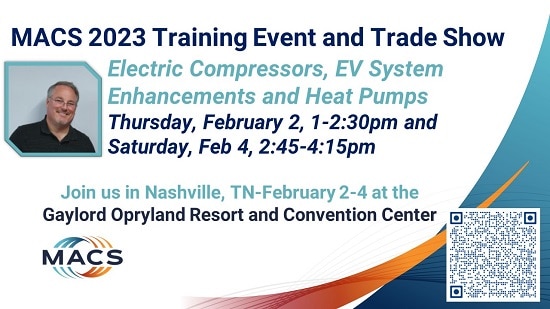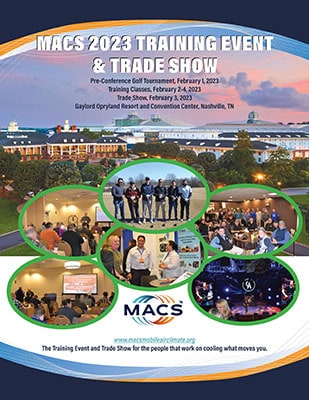Electric Compressors, EV System Enhancements and Heat Pumps
Mike Bailey’s class, Electric Compressors, EV System Enhancements and Heat Pumps at MACS 2023 Training Event and Trade Show kicks off an impressive track of electric vehicle (EV) training related to climate control, Thursday, February 2, 2023, from 1-2:30pm. Mike’s class will also be presented on Saturday, February 4 from 2:45-4:15pm. Sanden International is the MACS Silver sponsor of the Electric Vehicle Training Program.
This class is about:
Electric Compressors, EV System Enhancements and Heat Pumps

EV and hybrid manufacturers are searching for every yard/meter of range they can squeeze out of their vehicles. In the race to get their newest offerings into the driveways of consumers, range is a major factor. HVAC can severely effect vehicle range, and engineers are doing everything possible to reduce the impact of this creature comfort/necessity.
We will explore electric compressor design, 3-phase motor operation, and electronic compressor control. Testing a HIGH VOLTAGE (HV) electric compressor requires PPE, specific equipment, and procedures; both will be discussed and safely demonstrated.
Heat pump system theory, design, components, and operation will be discussed and demonstrated in heating and cooling modes using temperature and pressure analysis. Thermal management systems which usually incorporate an electric compressor and heat pump, will be fully explained.
Attend this highly informative mobile A/C training class and many more informative classes when your register for MACS 2023 Training Event and Trade Show, February 2-4, 2023, at the Gaylord Opryland Hotel and Convention Center In Nashville, TN.
Please make your Gaylord Opryland hotel reservations by January 9, 2023.

View the entire MACS 2023 Training Event program
Questions? Call MACS at 215-631-7020 x 0 or email info@macsmobileairclimate.org
